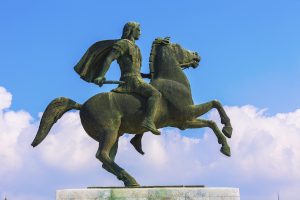 Alexander was humble and temperate.
Alexander was humble and temperate.
Ploutarchos characterizes him ” invulerable desire “, while Arrianos writes that he was ” temperate of the pleasures of the body ” (” The Anabasis of Alexander “, 28,2).
He never came close to a woman and never knew one before the wedding, because he regarded ” βασιλικώτερον τὸ κρατεῖν ἑαυτοῦ τοῦ νικᾶν τοὺς πολεμίους “, meaning it is much more significant and more royal than the king to conquer passion than to conquer the enemies ” (” The Anabasis of Alexander “, 21,7).
He demanded from his soldiers, when they arrested women, not to talk disgraceful in front of them, but to protect their morals as if they were girls in captivity that lived in holy and humble girl schools (” The Anabasis of Alexander “, 21,5).
And when Parmenion allowed him to come close to a beautiful girl, he refused, striking her beauty ” το της ιδίας εγκρατείας και σωφροσύνης κάλλος “, and showing modestry. Of course, the point remains uneffected from the women’s challenge, he tried to face women as cold and lifeless statues (” Anavasis of Alexander “, 21,9-11).
Basil of Caesar praised Alexander the Great’s campaign.
He explains that after the battle at Gavgamila, he went into the tent with Hephaestion where women from the royal home of the defeated Darius, amongst them was his mother Sisygambis, his wife Stateira. who was known as the most beautiful woman of Persia and the two beautiful daughters of the Persian king,leant his head toward the ground.
When he came out of the tent he answered to his friend, who was surprised with his attitude.
” It is not decent to rule the world with the enslavement of a woman’s beauty ” (” αἰσχρὸν εἶναι κρίνων τὸν ἄνδρα ἑλόντα ὑπὸ γυναικῶν ἡττηθῆναι “).


